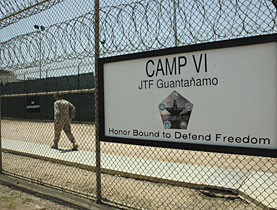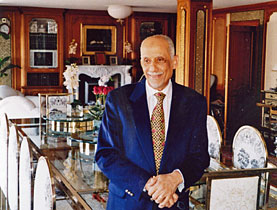Bern wants UN to coordinate better on terrorism

Switzerland has called for more efficient cooperation among the various United Nations bodies that are active in the fight against terrorism.
The Swiss ambassador to the UN, Peter Maurer, and representatives of Costa Rica, Japan, Slovakia and Turkey have put forward proposals about how the global strategy against terrorism agreed in the General Assembly in 2006 can be better coordinated.
“The fight against terror on its own is not enough. It needs possible solutions how we can be active beyond that,” Ambassador Maurer told swissinfo.
He said the discussion on terrorism had to be newly balanced and the strategy decided in 2006 was a first step. Now it was a question of putting it into practice more efficiently.
The UN Security Council agreed on a resolution, War against Terrorism, after the terrorist attacks against the United States on September 11, 2001. Resolution 1373 was adopted under Chapter VII of the UN Charter and is binding on all UN member states.
It seeks to stop the financing of terrorists and is aimed first and foremost against Al-Qaida and the Taliban. The resolution did not define the word “terrorism”.
Counter-terrorism resolution
Apart from the Security Council, the General Assembly also discussed the issue in September 2006 before it adopted a global counter-terrorism resolution.
The General Assembly took a wider approach to tackle the various forms of terrorism.
The strategy resolution said it was important “to address the conditions conducive to the spread of terrorism”.
These included long-lasting conflicts, ethnic, national or religious discrimination, human rights violations, socio-economic marginalisation or lack of good governance.
In order to prevent the spread of a climate of terror, the resolution said action was needed on many fronts, which included non-military measures, and which took account of social factors.
Review
A review of implementation of the strategy is on the agenda of the General Assembly at the beginning of September.
With this debate in mind, Switzerland and the other four countries have since last November held a series of workshops in which recommendations were presented in New York last week.
Switzerland and the other four states believe that the various UN bodies which are involved in the fight against terrorism have been not been working enough with each other.
The five aim for experts in the various areas of counter-terrorism to have closer contacts so that progress can be made together.
“It is naive to think that you can prevent terrorism around the globe with development aid alone,” Maurer said.
“And it’s just as naive to think that the terror problem can only be solved with war and bombs or by torturing detainees on an island.”
Balanced approach
He said progress could only be made when a balanced approach was taken, including all the various strands of the issue.
The initiators with their recommendations are also seeking to solve institutional questions inside the UN.
The global strategy against terrorism is also to be seen according to Maurer as a “necessary extension of the narrow perspective of the Security Council in the fight against terrorism”.
He said that it was not surprising that the five permanent Security Council members only marginally took part in the discussions.
Maurer added that important points for a balanced strategy were the rule of law, respect for human rights, as well as an effective integration of civil society and non-governmental organisations.
Large interest
He noted that there had been a large interest in the workshops, in which almost 40 states and parties from other areas took part. In particular there had been interest from Arab countries.
That such diverse countries as Switzerland, Costa Rica, Japan, Slovakia and Turkey had come together for the initiative was a sign that solutions or possible solutions could be found with dialogue.
The proposals are set to be included in a resolution that the General Assembly will adopt in the review of the counter-terror strategy in September.
swissinfo, based on an article in German by Rita Emch in New York
International cooperation in the fight against terrorism has intensified considerably since the terrorist attacks in the US on September 11, 2001.
There are 13 UN accords and additional protocols on the issue. Switzerland has ratified and applied 12 of them.
It has not ratified the Nuclear Terrorism Convention of April 13, 2005.
The Swiss House of Representatives approved it in March 2008 but the Senate still has to make its decision.
Switzerland, like all other UN member states, is obliged to apply all the resolutions on terrorism of the Security Council.
This chapter sets out the UN Security Council’s powers to maintain peace.
It foresees a wide range of sanctions against states which threaten peace. The measures range from economic sanctions to military force.
Chapter VII sets out how the international community should react after determining “the existence of any threat to the peace, breach of the peace, or act of aggression”.

In compliance with the JTI standards
More: SWI swissinfo.ch certified by the Journalism Trust Initiative










You can find an overview of ongoing debates with our journalists here . Please join us!
If you want to start a conversation about a topic raised in this article or want to report factual errors, email us at english@swissinfo.ch.